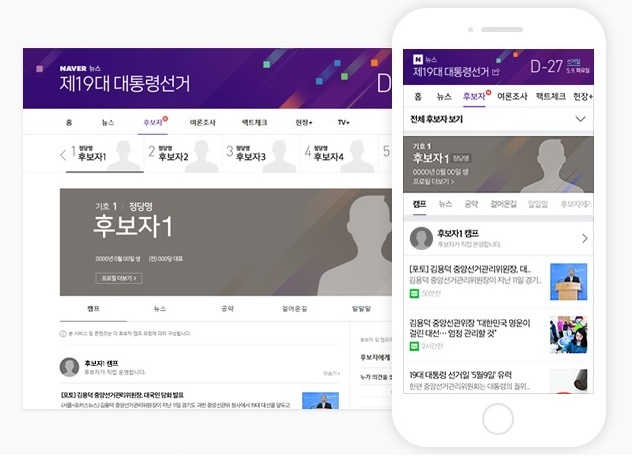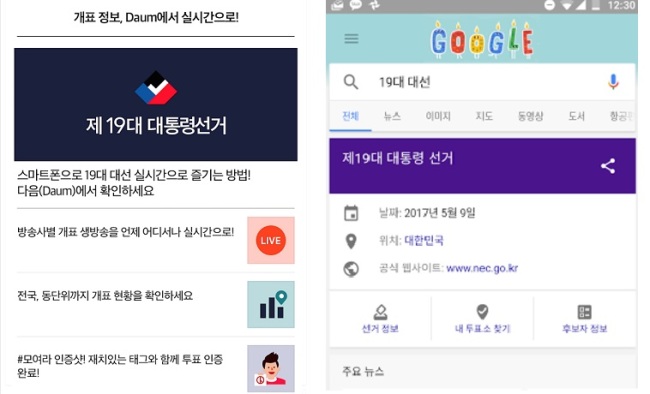As South Korea prepares to hold its 19th presidential election Tuesday, the country’s major internet companies have set out to provide the public with accurate, timely and convenient information about the candidates and real-time voting updates.
Naver, the operator of Korea’s most widely-accessed portal website, has a special section on its election page that will continuously update voting information as the results come in. The portal operator said it will display the information based on real-time data from Korea’s National Election Commission, which is in charge of administering the election.

(Naver)
The special election page will continuously update the number of votes won by each candidate nationwide, as well as give a breakdown of the results by city, province, district and neighborhood. People will also be able to view the percentage and net number of absentee votes each candidate has received.
Naver will also provide a feature that lets users select and view election coverage by Korea’s major public and private broadcasters as well as the National Election Commission.
Kakao, which runs Korea’s dominant mobile messenger KakaoTalk and the portal website Daum, has also set out to offer critical election data to users through online and mobile platforms.

(Daum, Google)
In particular, its special election page, accessible via Daum and KakaoTalk’s channel tab, uses artificial intelligence technology to analyze each candidate’s campaign pledges.
Kakao said it has applied its AI-based media processing and natural language processing technology to determine how many times each candidate has mentioned each of his or her 10 campaign pledges to help voters visualize each candidate’s campaign consistency and focus.
This information, extracted by analyzing the content of all the related news articles uploaded to Daum’s news service from 2013 until now, is being displayed in a real-time graph broken down by categories such as political reform, defense, labor, welfare and gender equality.
To encourage more people to vote, Kakao is also running a “find your voting booth” page on its apps and services as well as a hashtag event that lets users upload snapshots showing that they have cast their vote. It will also offer users access to real-time voting data as well as election coverage programs on major television news channels.
Likewise, Google has also launched a number of election-specific features for Koreans. By typing “presidential election” into the Google search engine in Korean, they can view links to each candidate’s campaign websites, access voting information and search for their designated polling station.
In a move to offer further data-driven information about the election, Google has prepared Google Trends analyses of each candidate and his or her party’s search query volume on Google via a graph, among other information.
By Sohn Ji-young (jys@heraldcorp.com)


![[Exclusive] Korean military set to ban iPhones over 'security' concerns](http://res.heraldm.com/phpwas/restmb_idxmake.php?idx=645&simg=/content/image/2024/04/23/20240423050599_0.jpg&u=20240423183955)

![[Graphic News] 77% of young Koreans still financially dependent](http://res.heraldm.com/phpwas/restmb_idxmake.php?idx=645&simg=/content/image/2024/04/22/20240422050762_0.gif&u=)


